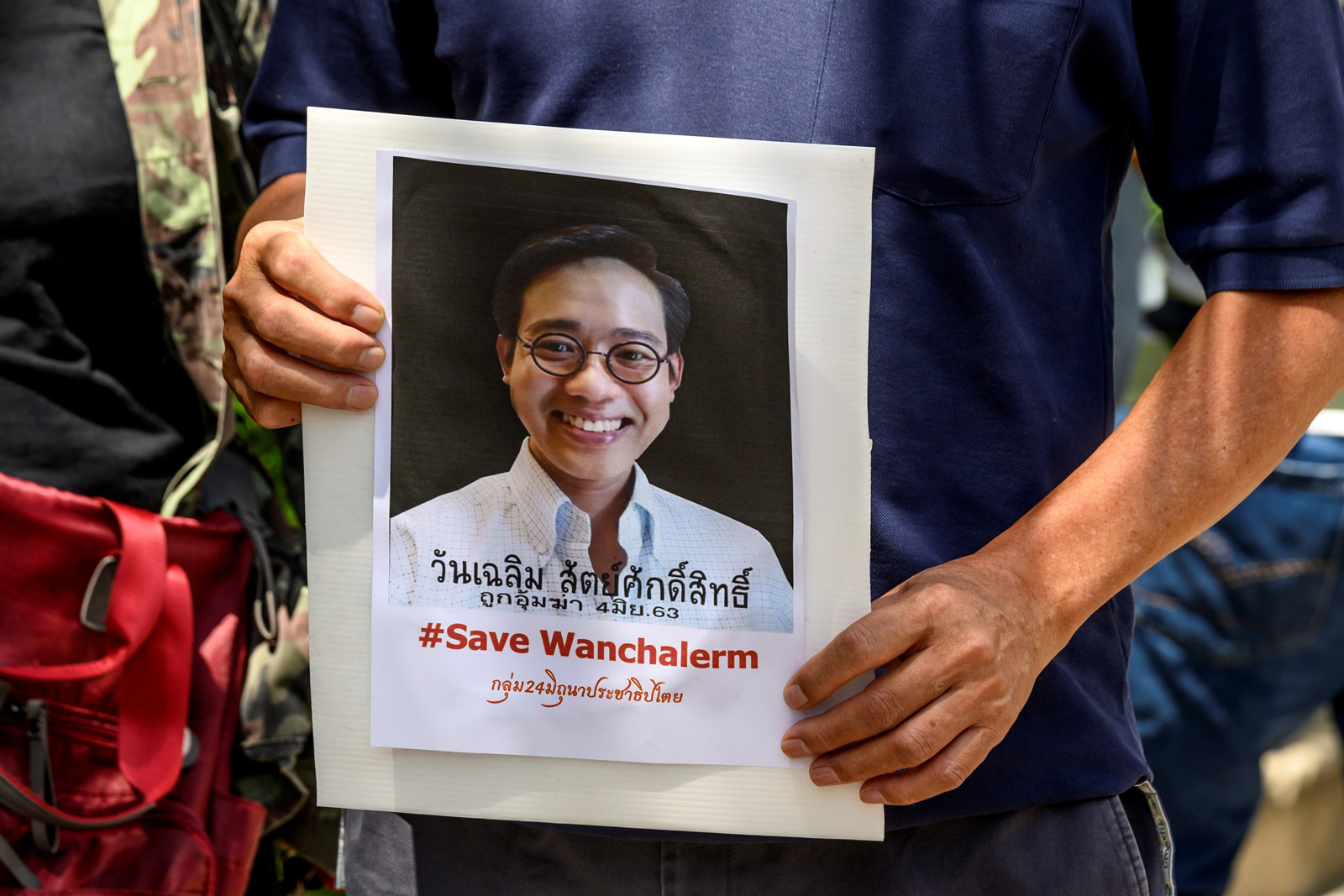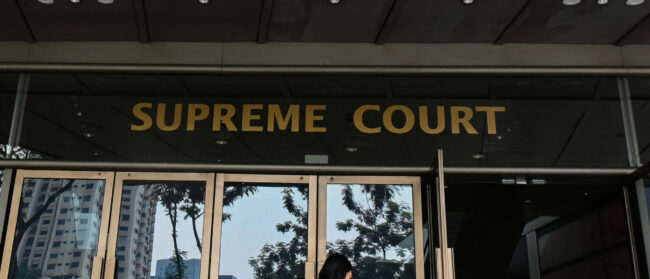June 19 marked the 30th anniversary of the disappearance of Thanong Po-Arn, a prominent critic of the 1991 military coup that was led by General Suchinda Kraprayoon.
Thanong was head of the Labour Congress of Thailand, the largest labour organisation in the country, as well as deputy chairman of the International Council of Free Trade Unions. Prior to his disappearance, he received anonymous death threats, telling his family: “If for three days I don’t contact you, that means I have been arrested; if it’s more than seven days, that means I have already died.”
Originally slated to be a member of the Thai delegation to an International Labour Organization (ILO) convention in Geneva, he was hastily removed by the military government. Thanong disappeared just days before the ILO conference was scheduled to begin. The 55-year old insulin-dependent diabetic was never heard from again. All that was found was his empty car, left near his office in the Rat Burana district of Bangkok.
Thanong’s disappearance remains shrouded in mystery. Dating all the way back to 1991, theories abound as to why he disappeared and rampant speculation persists about what kinds of activities he might have been engaged in. The Royal Thai Police noted that without the presence of a body, they couldn’t speculate that he met with an untimely end.
Some suggested that he might have been assassinated by labour rivals or gangsters to which he owed money, or even by former mistresses. Others suggested that he staged his own death to avoid the many enemies he had made. Of course, none of these theories can be proven.
Each year on August 30, the United Nations recognises the International Day of the Victims of Enforced Disappearances, in solidarity with hundreds of thousands of victims of forced disappearances from around the world. While a column on this subject on that date is surely apropos, recent developments in Thailand, particularly the case of Wanchalerm Satsaksit, the Thai satirist and regime critic who disappeared in June last year while in self-exile in neighbouring Cambodia, warrant the issue of forced disappearances additional attention.
CCTV footage of the two cars believed to have been involved in the kidnapping of Wanchalearm.
Thanong and Wanchalerm, although their cases are decades apart, share much in common – that their relatives are likely to never to know the circumstances surrounding their disappearance and will seldom, if ever, get updated information from Thai authorities.
Forced disappearances in Thailand present a challenge to both human rights defenders. The state has created and nurtured a culture of impunity that protects perpetrators from prosecution, while the lack of a domestic law that establishes forced disappearance as a crime lessens the severity of punishments that can be given upon rare conviction. Also worthy of mention is the changing nature of forced disappearances, as they are not always brought about by state actors.
Complicity
In countries like Thailand with degraded criminal justice systems, corrupted judicial institutions, and consistent abuse of the rule of law, prosecution of suspects in the disappearance of many victims remains low, as does accountability. Human rights organisations attempting to document individual cases often face impossible obstacles, from local interference, death threats, a lack of legal and personal protection for witnesses, and complicity on the part of Thai authorities.
The 2019 case of three dissidents, Chucheep Chiwasut, Siam Theerawut, and Kristana Thapthai, all accused of lèse majesté, is particularly illustrative. After fleeing to Laos after the 2014 coup, then later into Vietnam, reports from a US-based human rights group alleged that Vietnamese border guards returned the trio to Thailand.
Many human rights groups have accused the Thai military of being complicit in the deaths of regime critics. In January 2019, Chatcharn Buppawan and Kraidej Luelert were found along the Mekong River border with Laos, their bodies stuffed with concrete, which caused them to sink to the bottom. Their disappearance from Laos raised concerns that regime critics and those voicing displeasure at the monarchy are being targeted in exile.
Neighbouring countries are not safe havens any longer, as many families can now attest. Suspicions were also raised when Laos pledged to help track down Thai activists hiding within their borders – and more importantly, when Thai Prime Minister Prayut Chan-o-cha requested their assistance in bringing back lèse-majesté exiles, shortly after arriving for a bilateral meeting in December 2018, the exact period of time the activists were reported missing.
Of course, complicity on the part of the state was also rife during the Thaksin Shinawatra years, as his hard-line approach to the conflict in the Southern provinces saw the police involved in the unexplained disappearances of many Malay-Muslim men.

The hybrid state
Forced disappearances are a chronic and worldwide problem. It is a critical human rights challenge in all corners of the globe, from Mexico to Syria, where in 2019 it was reported that the Assad regime had forcibly disappeared more than 98,000 people since March of 2011. In broader Asia, Sri Lanka was one of the worst offenders, with as many as 100,000 victims dating back to the 1980s when the country was engaged in a brutal civil war.
Angelica Blasi, in a blog article for the London School of Economics, argued that in “hybrid” states – particularly Mexico – there is a point to which the reach and the density of corruption “creates an environment in which criminal non-state actors and the state become equal shareholders”, which blur the boundaries between the state and the criminal enterprise. Blasi suggests that because of this hybrid form of the state, it means that while the perpetrator of a disappearance may not be the state itself, it may be involved in other ways.
While comparing Thailand to Mexico might be a step too far, there have been forced disappearances where the actor involved is not the state, but a corporate entity. In Thailand’s southern provinces, there have been violent confrontations between mining companies and palm oil companies, with land rights activists the target of assassinations and forced disappearances – and in the case of Eakachai Itsaratha, an attempt to intimidate.
In 2019, Eakachai was confronted by 10 unidentified men just before he was about to attend a public hearing for a rock quarry project in Phatthalung province. Eakachai was then taken to a hotel until the public hearing ended, after which the assailants threatened him and his family if he reported the incident to the police. Eakachai was also warned not to return to the mountain villages, as his activities had negatively impacted the quarry project.
Local journalists were also intimidated. Other land rights groups have suffered worse fates, with local politicians and palm oil companies colluding in acts of violence.
As Blasi noted, many forced disappearance cases lack the linkage back to the state, an oversight in the UN International Convention for the Protection of All Persons from Enforced Disappearance (UNCED). Instead these cases lack the international standing that demands tougher criminal penalties. The UN Working Group on Enforced and Involuntary Disappearances (WGEID) reported in September 2019 that there were 82 unresolved cases of enforced disappearances in Thailand since 1980, although it represents a small percentage of the total number of enforced disappearances since the 1950s.
Many of those who have gone missing were either land rights activists or engaged in acts of environmental protection.
Culture of impunity
Thailand has yet to ratify the UNCED, even after pressure from local civil society groups, human rights organisations, and international experts. Equally frustrating to victims and international actors is the lack of a domestic law that would criminalise forced disappearances. These twin deficiencies create and nurture a culture of impunity for both agents of the state and non-state actors.
Emblematic of impunity in forced disappearances is the case of Somchai Neelapaijit, a human rights lawyer from the south of Thailand. Somchai disappeared in March 2004 after several eyewitnesses saw a group of assailants forcing him into a car on Ramkhamhaeng Road in Bangkok.
At the time of his disappearance, Somchai was representing five Muslim men that were accused of gun robbery, who were allegedly tortured by police while in their custody. For representing the five men, he had received death threats, but then-Prime Minister Thaksin Shinawatra downplayed concerns for his safety by suggesting his disappearance was due to a “family” problem.
For every high profile disappearance case that makes headline news in Thailand, there are others that garner no attention at all
After his disappearance, five police officers were arrested, including Police Maj. Ngen Tongsuk of the Crime Suppression Division. However, the indictment didn’t charge any of the officers with abduction or murder, as under Thai law filing a murder charge requires physical evidence to prove that a person is dead. Instead they were charged with “forceful restraint” and other more minor charges. In 2015, the Supreme Court acquitted the five officers of their charges, citing weak evidence.
Angkhana Neelapaijit, Somchai’s wife and now a human rights activist, has expressed frustrations about the difficulty in pursuing cases against state officers. She detailed threats and acts of intimidation, as well as a series of obstacles toward justice. The Supreme Court ruling from 2015 effectively eliminated her efforts to win damages, as Angkhana could not act as a co-plaintiff in the case due to the fact that there was no conclusive evidence suggesting he was dead.
In June of 2011, the WGEID requested an invitation to visit Thailand. It was followed up with reminders in consecutive years, still without a formal response or acceptance from the Thai government. Several attempts have been made to bring legislation to Parliament that would criminalise forced disappearances, most recently in July last year, but to date none have been successful. For every high profile disappearance case that makes headline news in Thailand, there are others that garner no attention at all.
Their investigations, like that of Somchai, Thanong, and Wanchalerm, remain stalled.
Mark S. Cogan is an Associate Professor of Peace and Conflict Studies at Kansai Gaidai University in Osaka, Japan. He is a former communications specialist with the United Nations in Southeast Asia, Sub-Saharan Africa, and the Middle East.



